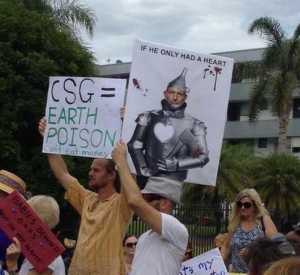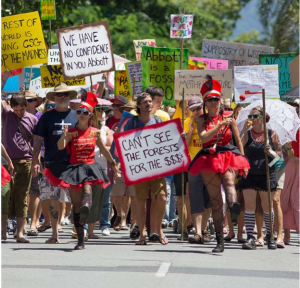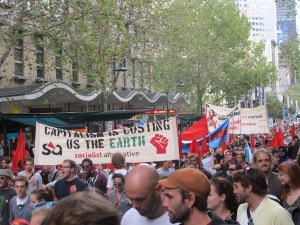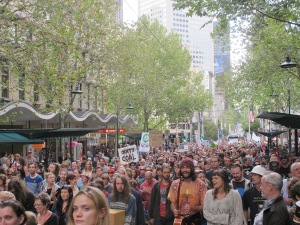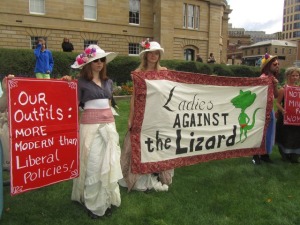Dear friends,
I am reblogging my friend and fellow activist, Aamer Rahman’s excellent article which was published recently by Crikey and which appears on his Tumblr. Aamer is one of Australia’s best young political comedians. For the last couple of years he has been performing with Nazeen Hussain, as part of Fear of a Brown Planet. Aamer has also been a political activist since his university days, campaigning against racism and social injustice.
If you haven’t already checked out his Tumblr, you can do so by clicking here. I have also included below the article, two short videos showcasing his political comedy, as well as Australian Story’s 2011 program on Fear of a Brown Planet.
in solidarity, Kim
Dear Mark,
As a comedian I very much appreciated your satirical piece ‘How Racist Are You?’ published in The Age last week. I think you captured the attitude and tone of Overly Defensive And Clueless White Man perfectly. It’s actually inspired me to write my own piece called “Hey Ladies, Pipe Down About Sexism.”
Of course, I’m being silly. You didn’t write it as a parody piece. The truth is much more embarrassing. This is what you, and plenty of others, actually think: apparently racism is totes not a thing any more.
Being told by white people that racism is a figment of our imagination is nothing new. I know well enough that when looking for some quality racism, the best place to start is with the guy screaming “I’m not racist!” You did not disappoint.
Thank you for the awkward list of times you didn’t challenge people’s casual racist comments. As the kids say nowadays, cool story bro. And maybe you’re right – there is nothing that justifies calling Australia uniquely racist. Not the specific genocide of Aboriginal and Torres Strait Islander peoples, cultures and languages, an unparalleled migration history that banned non-white immigration here until the early 70s, or our one-of-a-kind anti-asylum regime. These are things that happened pretty much everywhere, right? But seriously, why let history and facts get in the way of a white guy’s Feelings About Stuff.
You’re correct, far right parties like One Nation are a thing of the past. But only because their rampant xenophobia was quickly co-opted, re-branded and shared between Labor and Liberal, making Hanson totally redundant. In an era where our Attorney General openly defends the art of bigotry, Pauline’s services are no longer required.
You ask how many people alive are truly racist. I don’t know the exact figures, Mark. But ask yourself if the life expectancy statistics that apply to Aboriginal people – well below the national average – would be tolerated if they applied to any other group in this country . Ask yourself if our system of militarised border protection and detention – recognised as exceptional the world over – would be acceptable to the Australian public if it was designed to intercept, round up and indefinitely incarcerate white people.
These things cannot exist without a sizeable population of what you refer to as ‘true racists.’ The fact that, as a nation, we accept and allow such things to happen is not an accident or the result of simple misunderstandings. They are the calculated outcomes of generations of programming. Maybe racism is less about white people making unfortunate comments and more about systemic inequalities that have become the permanent and invisible background noise of Australian culture. To quote you, it may pay to look at the bigger picture.
It’s 2014, champ. Racism isn’t about segregated lunch counters and people refusing to shake hands any more. Racism is about this country’s obsession with defining boundaries of inclusion and exclusion, and the pervasive and violent ways in which those boundaries are maintained. Racism is about two major parties collaborating for years to convince a white majority, through various codes, that they are perpetually at risk of losing out to lazy Aborigines, ghettoised migrants, dishonest asylum seekers and suspicious Muslims. Racism is a government using free speech rhetoric to facilitate racial vilification. Racism is, in a climate of perpetual fear and hostility, The Age choosing to publish some childish nonsense about how there’s no such thing as racism.
You’re convinced things have changed. I’m pretty confident they haven’t.
Aamer Rahman is a standup comic and writer in Melbourne. He is currently touring his solo show The Truth Hurts in the UK and does not miss Australia.
Aamer Rahman: Refugees
Aamer Rahman: Reverse Racism
Australian Story: Fear of A Brown Planet – 7 November 2011




